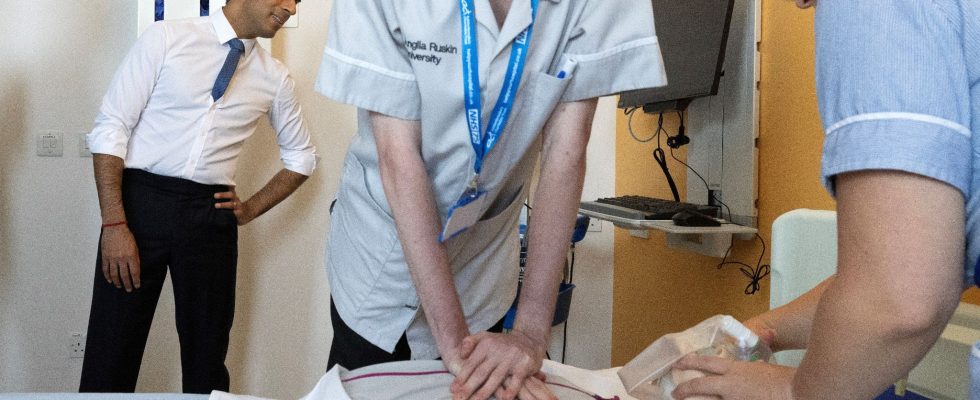Life expectancy below its 2010 level, infant mortality increasing since 2014, cancer survival chances among the lowest in industrialized countries, the tripling in ten years of the number of people unable to work for reasons of chronic illness, 7 million patients waiting for an operation… The list of ailments from which our British neighbors suffer is long. And the newspapers across the Channel are bringing out an expression that they used to use in the 1970s: We are “the sick man of Europe” they headline. Literally.
Prime Minister Rishi Sunak brushed aside these worrying findings and figures with a concise statement: “In ten years, work stoppages due to chronic illnesses have tripled, but do I think our country is three times sicker than before? No!” He has difficulty convincing.
Studies, statistics and international rankings are clear. A study of the Less Survivable Cancers Taskforce looking at the survival rate of cancer patients in the 33 richest countries in the world places the United Kingdom in 28th place for stomach and lung cancers, and 26th for pancreatic cancer. If the British caught up with Belgium or Australia, 8,000 lives would be saved each year, according to the study. A figure which would increase to 20,000 deaths avoided, all cancers combined, according to the organization Cancer Research UK.
Little Britons are shrinking
The cause of this excess British mortality? The long delay in diagnosis and the very slow treatment of patients: one in two Britons waits eighteen weeks to receive their treatment. The diagnosis is often made when the disease is already at an advanced stage. As proof, 7 out of 10 pancreatic cancer patients do not get any treatment because it is already too late.
We could also mention life expectancy which has fallen for the first time in forty-five years according to the Office for National Statistics (78.6 years for men and 82.6 years for women, less than the Italians , the French or the Canadians). But other announcements have caused more trouble across the Channel. “Honey, I made the kids shorter!”, headlined certain tabloids to humorously illustrate a disturbing reality: British children are now shorter than in the 1980s.
Looking more closely at the figures, British boys and girls aged 5 have seen their height plateau and then decline since 2009, placing them 102nd in the world, compared to 69th place in 1985. Today Today, at 5 years old, British children are on average 3 cm shorter than Spaniards and 5 cm shorter than Italians and Egyptians! At the same age, the French exceed them by 2 cm and the Dutch by 7 centimeters.
Too many ultra-processed foods
The guilty ? The diet, in particular. A study of the newspaper Obesity Reviews on the diet of 66,000 children in eight countries, including the United States, Brazil and Australia, reveals that the diet of British children is made up of 61% ultra-processed products (even more than in the United States). -United States) which has repercussions on their growth and health.
Former scientific advisor to the Ministry of Health and author of Whose Health Is It, Anyway?, hematologist Sally Davies sounds the alarm: “We are living longer than a hundred years ago, but in poorer health, which has economic consequences. The Health Foundation predicts that the share of the population living with serious illness will increase nine times faster than that of the active population by 2040, which means an increase in work stoppages and incapacity, labor shortages, less tax revenue, more social spending and a vicious circle of low growth and productivity. Yet we now know that 4 in 10 cancers and 8 in 10 heart attacks and strokes could be avoided in the UK “if only our health system focused on prevention rather than treatment of disease!”
Labor, who, according to opinion polls, are preparing to take the reins of power in the fall, after the general election, are working on the subject. Their leader, Keir Starmer, announced a plan for childhood with a national toothbrushing campaign for 3-5 year olds to curb the deplorable dental hygiene of British children. “Today, the first cause of admission to hospital for 6-10 year olds is their decayed teeth. It’s shocking,” the opposition leader was indignant, before adding: “we want that the next generation of Britons chases their dreams, not a hypothetical appointment to the dentist.” Keir Starmer also wants the presence of a psychologist in every school, a ban on disposable electronic cigarettes popular with adolescents, and free, healthy breakfasts in primary schools to combat childhood obesity.
In a public appeal, former Prime Minister Tony Blair and former Conservative leader William Hague propose two solutions: making their examinations available to patients, until now reserved exclusively for their doctor, so that they can take charge of their health. And the creation of a NHS Data Trust for the exploitation of all this data by artificial intelligence for the purposes of rapid diagnosis and treatment, but also for research. The “biotech revolution”, they say, must become a national priority and the subject of massive investment.
In the meantime, more and more Britons who can afford it are taking out private health insurance. Already, 26% of 18-64 year olds have one – compared to 17% in 2022. At Aviva, leader in this market, subscriptions to health coverage increased by 23% in the last quarter of 2023. A trend that is not imminent to slow down and will further widen inequalities across the Channel.
.
